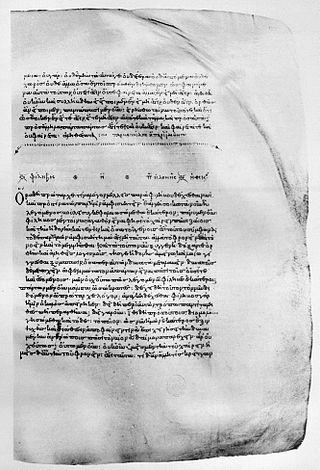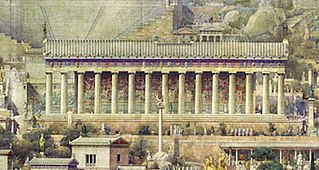
A virtue is a trait of excellence, including traits that may be moral, social, or intellectual. The cultivation and refinement of virtue is held to be the "good of humanity" and thus is valued as an end purpose of life or a foundational principle of being. In human practical ethics, a virtue is a disposition to choose actions that succeed in showing high moral standards: doing what is right and avoiding what is wrong in a given field of endeavour, even when doing so may be unnecessary from a utilitarian perspective. When someone takes pleasure in doing what is right, even when it is difficult or initially unpleasant, they can establish virtue as a habit. Such a person is said to be virtuous through having cultivated such a disposition. The opposite of virtue is vice, and the vicious person takes pleasure in habitual wrong-doing to their detriment.
Ancient Greek philosophy arose in the 6th century BC. Philosophy was used to make sense of the world using reason. It dealt with a wide variety of subjects, including astronomy, epistemology, mathematics, political philosophy, ethics, metaphysics, ontology, logic, biology, rhetoric and aesthetics. Greek philosophy continued throughout the Hellenistic period and later evolved into Roman philosophy.
Eudaimonia, sometimes anglicized as eudaemonia or eudemonia, is a Greek word literally translating to the state or condition of 'good spirit', and which is commonly translated as 'happiness' or 'welfare'.

Virtue ethics is an approach that treats virtue and character as the primary subjects of ethics, in contrast to other ethical systems that put consequences of voluntary acts, principles or rules of conduct, or obedience to divine authority in the primary role.

Moderation is the process or trait of eliminating, lessening, or avoiding extremes. It is used to ensure normality throughout the medium on which it is being conducted. Common uses of moderation include:

Temperance in its modern use is defined as moderation or voluntary self-restraint. It is typically described in terms of what a person voluntarily refrains from doing. This includes restraint from revenge by practicing mercy and forgiveness, restraint from arrogance by practicing humility and modesty, restraint from excesses such as extravagant luxury or splurging, restraint from overindulgence in food and drink, and restraint from rage or craving by practicing calmness and equanimity.
Kalos kagathos or kalokagathos, of which kalokagathia (καλοκαγαθία) is the derived noun, is a phrase used by classical Greek writers to describe an ideal of gentlemanly personal conduct, especially in a military context.

Arete is a concept in ancient Greek thought that, in its most basic sense, refers to "excellence" of any kind—especially a person or thing's "full realization of potential or inherent function." The term may also refer to excellence in "moral virtue."

The Nicomachean Ethics is among Aristotle's best-known works on ethics: the science of the good for human life, that which is the goal or end at which all our actions aim. It consists of ten sections, referred to as books, and is closely related to Aristotle's Eudemian Ethics. The work is essential for the interpretation of Aristotelian ethics.
In Ancient Greek philosophy, techne is a philosophical concept that refers to making or doing. Today, while the Ancient Greek definition of techne is similar to the modern definition and use of "practical knowledge", techne can include various fields such as mathematics, geometry, medicine, shoemaking, rhetoric, philosophy, music, and astronomy.
Phronesis is a type of wisdom or intelligence concerned with practical action. It implies both good judgment and excellence of character and habits, and was a common topic of discussion in ancient Greek philosophy. Classical works about this topic are still influential today. In Aristotelian ethics, the concept was distinguished from other words for wisdom and intellectual virtues—such as episteme and sophia—because of its practical character. The traditional Latin translation is prudentia, which is the source of the English word "prudence".
Sophrosyne is an ancient Greek concept of an ideal of excellence of character and soundness of mind, which when combined in one well-balanced individual leads to other qualities, such as temperance, moderation, prudence, purity, decorum, and self-control. An adjectival form is "sophron".
In metaphysics, balance is a point between two opposite forces that is desirable over purely one state or the other, such as a balance between the metaphysical law and chaos — law by itself being overly controlling, chaos being overly unmanageable, balance being the point that minimizes the negatives of both.
Aristotle first used the term ethics to name a field of study developed by his predecessors Socrates and Plato which is devoted to the attempt to provide a rational response to the question of how humans should best live. Aristotle regarded ethics and politics as two related but separate fields of study, since ethics examines the good of the individual, while politics examines the good of the city-state, which he considered to be the best type of community.

Magnanimity is the virtue of being great of mind and heart. It encompasses, usually, a refusal to be petty, a willingness to face danger, and actions for noble purposes. Its antithesis is pusillanimity. Although the word magnanimity has a traditional connection to Aristotelian philosophy, it also has its own tradition in English which now causes some confusion.

The Philebus is a work by the ancient Greek philosopher Plato, written in dialogue form. It presents a fictional conversation between Plato's teacher Socrates and two young Athenians, Philebus and Protarchus. The main topic is the ethical evaluation of pleasure.
Amicus Plato, sed magis amica veritas is a Latin phrase, translating to "Plato is my friend, but truth is a better friend ." The maxim is often attributed to Aristotle, as a paraphrase of the Nicomachean Ethics 1096a11–15.
Ethics is the branch of philosophy that examines right and wrong moral behavior, moral concepts and moral language. Ethics or moral philosophy is a branch of philosophy that "involves systematizing, defending, and recommending concepts of right and wrong behavior". The field of ethics, along with aesthetics, concerns matters of value, and thus comprises the branch of philosophy called axiology.

The Delphic maxims are a set of moral precepts that were inscribed on the Temple of Apollo in the ancient Greek precinct of Delphi. The three best known maxims – "Know thyself", "Nothing in excess", and "Give a pledge and trouble is at hand" – were prominently located at the entrance to the temple, and were traditionally said to have been authored by the legendary Seven Sages of Greece, or even by Apollo. In fact, they are more likely to have simply been popular proverbs. Each maxim has a long history of interpretation, although the third of the set has received comparatively little attention.
In Jewish literature, the golden mean is primarily associated with the philosopher Rambam, and was influenced by the Greek philosopher Aristotle. In Mishneh Torah, Rambam attributes the method to the first scholars (Chazal) and to Abraham. Similar concepts exist in the Rabbinic literature, Tosefta, the Yerushalmi, and Musar literature. Rabbi Yitzhak Arama also finds references in the Bible.








